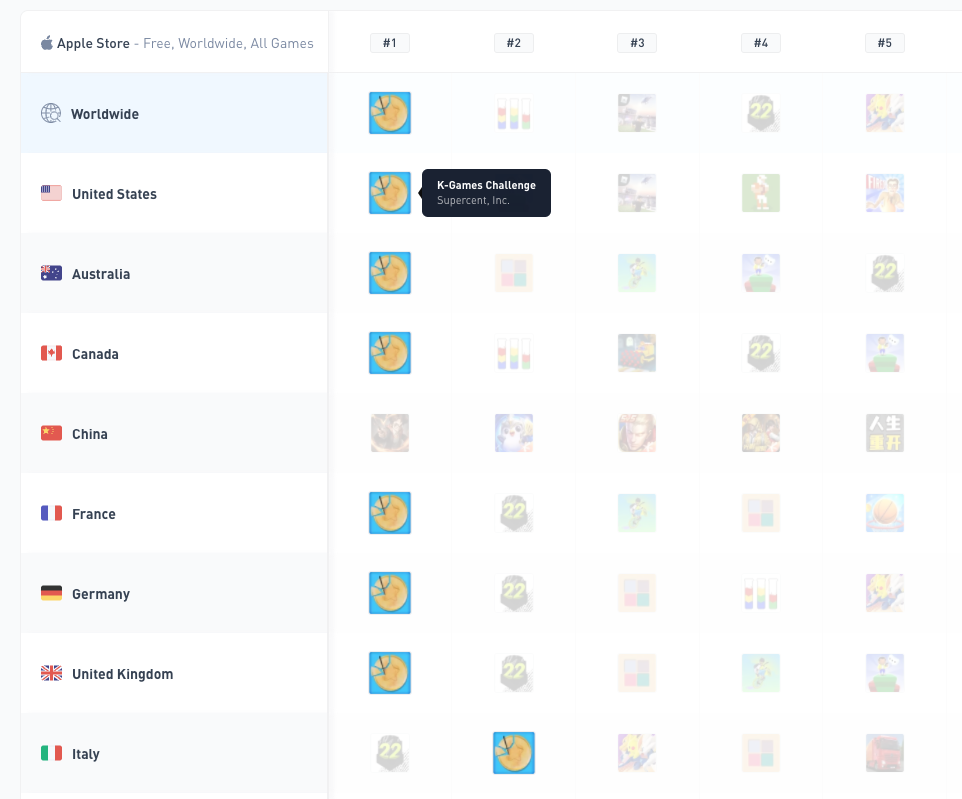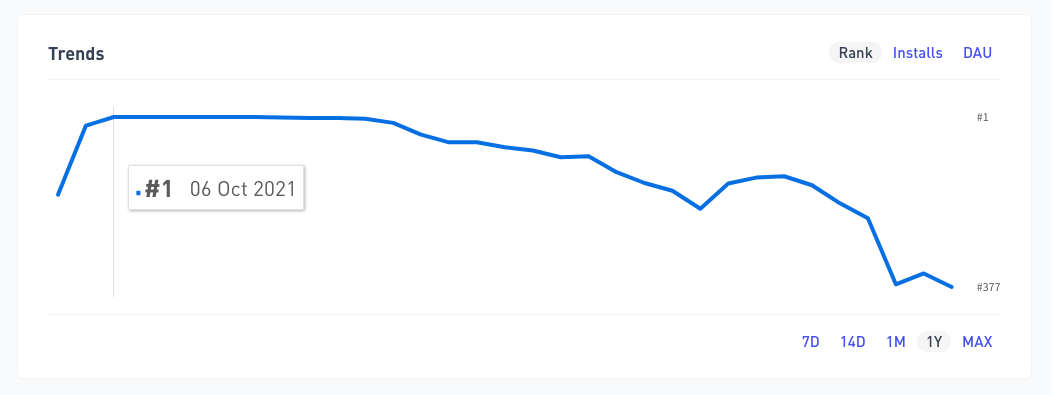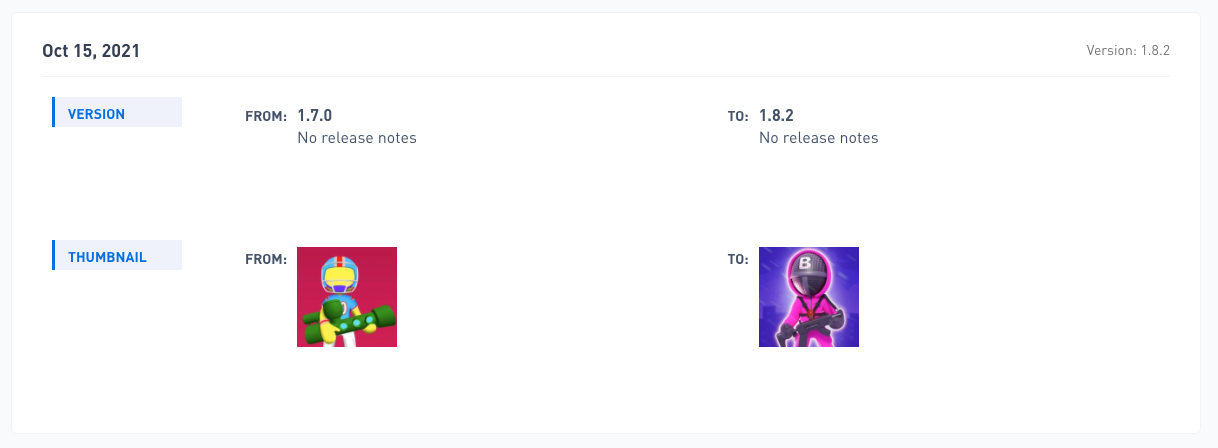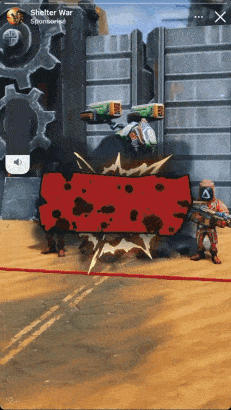Netflix recently released the new show Squid Game on September 17, 2021. Over 132 million people saw the show in the first 23 days of its release, with 4.4 million new people subscribing to the platform (presumably to watch the series). It’s easily a new record for Netflix to overtake Bridgerton’s # 1 spot. Netflix has even announced that it is developing its own “Squid Game” game to increase its popularity in regions like North America.
Netflix aren’t the only ones benefiting from this Korean battle royale show. We are inundated with memes, Halloween costumes, and merch related to the hit around the world. But mobile games are even more important. We’ve seen hundreds of hyper-casual games on the app stores, all of which are inspired by the Squid Game theme.
Since the topic is still trending and on everyone’s lips, we wanted to dive into the data side of things. Using GameIntel’s insights, we kept a close eye on the top charted games in the App Store, especially from the 200+ titles that made it to the top.
We pulled this data from GameIntel
All data on this blog is from GameIntel. It’s our market intelligence tool designed for developers of all sizes to research industry trends and keep track of the charts in the mobile gaming market. You can see the top hits for all the major nations, check out global hits and top performing publishers, and even see performance and usage estimates for top games. And much more.
We especially look at the top charts and global hits. We are interested in which Squid Game-inspired titles made it into the top charts in which countries and for how long.
Why is Squid Game such a good mobile game?
If you haven’t had a chance to see the show, there are six rounds (games) it will take contestants to get through. All are based on Korean children’s games. There is a tug of war, candy carving and various dice games (plus the now famous red light, green light). And because of the nature of hyper-casual games (which are quick to develop because of their simple gameplay and mechanics), each round can easily be turned into a hyper-casual game.
Netflix essentially handed the developers a record of hyper-casual games with its very own trend. Millions of gamers want to try these “tests” for themselves and are turning to the gaming industry to make them come true.
Insights from GameIntel
Earliest game started: a sugar cake picking game simulator
The earliest game we can see in the top charts for the App Store is 闯关 游戏 模拟器 – 抠 糖饼 from 成 蛟 何 (which loosely translated means “Breakthrough Game Simulator-Sugar Biscuit”). It kicked off in China, Hong Kong and Taiwan on September 29, just 12 days after Squid Game was released, and peaked at number 2 on the charts shortly afterwards.
It copies all of the challenges from Squid Game. Interestingly, however, the developers chose to include the keywords “Sugar” and “Biscuit” and “Simulator” in the title. This could be due to the popularity of the second round in Squid Game, which suggests that players are looking for it on the App Store.
Although it launched on September 29, it didn’t hit the top 20 charts in China until October 2. Which is incredibly impressive to get from launch to the charts in just a few days. The game stayed in the top charts for the first few weeks and then dropped to # 67 on October 18 (just a month after the show aired). Presumably it’s because other games made their way into the charts.
TO UPDATE: We just learned that this was a copycat app. It has now been removed from the App Store due to copyright infringement. While it was the first game to make the top 20 games (from what we can see), it’s actually not the first game to make it as a hit. That goes to the K-Games Challenge, the next title we’re talking about.
First game to make it worldwide: K-Games Challenge
The next game to hit the global charts was Supercent’s K-Games Challenge. All rounds of Squid Game are viewed in a similar manner. It was launched on October 2nd and hit the charts in Portugal and Brazil on October 4th.

It was the first “Squid Game” title to make it worldwide. just two and a half weeks after Squid Game was first released. On October 5th, it hit the charts for the United States, France, Canada, Russia, Germany, Belgium, Denmark, Finland, and more. And it reached number 1 in almost all countries on October 6th. It is probably the first game to really take advantage of this trend.
It currently has a rating of 4.5 with 17,300 ratings on the US App Store. Much like the previous title we talked about, it stayed in the top charts until October 18th. It now ranks 190th in games and 60th in simulation.

Top ranking game to consistently reach number 1: Candy Challenge 3D
Then we have Candy Challenge 3D, created by Idil Morgul. This title, released on October 2nd, only made it into the charts on October 7th (20 days after it aired). Unlike the first two titles we talked about, this game focuses more on the second challenge on the show: cutting a shape out of a honeycomb without breaking it. It has adopted the keyword “candy” in its name, and most of the pictures and descriptions are centered around this particular challenge.

It reinforces other challenges, but these are subordinate to the core concept. It’s worth noting that it has stayed on the charts since then, hitting number 1 repeatedly in several markets. With our machine learning, we also gave this game a score of 32,000, beating the K-Games challenge.
This could be due to the positioning of the game that uses Squid Game’s second candy game. But it was the highest ranked game that hit the charts and has been consistently in the top 10 for the longest time. It also has the highest rating at 4.58 and over 37,000 total ratings.
At least 3 games in the global top 10 charts are “Squid Game” titles
As of October 9th, at least 3 “Squid Game”-inspired games were in the top 10 of the game charts in almost all countries. Which was true for a good two weeks, until October 25th. During its heyday, we saw around 4 or 5 Squid Game-inspired games in the top 20 games for each country.
Since then, we’ve mainly seen only two games that have made it into the top charts on a regular basis; Candy Challenge 3D by Idil Morgul and Survival Game – 3D Challenge by Kien Nguyen. Which just shows how very fleeting trends in the mobile gaming industry can be and how important it is to jump on them from the start.
“Challenge” is the top keyword for the chart-topping Squid Game title
Of the top “Squid Game” -style games that we’ve seen in the Top 20 charts since they started, 70% contain the keyword “Challenge”. For IP reasons (we think so) these games cannot (or at least should not) use “Squid Game” in the title. But they all included part of the show in the descriptions and titles.
- Candy challenge 3D
- K games challenge
- All challenges – survival game
- survive challenge 3D
- Survival Game – 3D challenge
- Survival Games: Life challenge
- Dalgona challenge 3D!
- Breakthrough Game Simulator-Sugar Biscuit- “Breakthrough Game Simulator-Sugar Biscuit”
- Bridge Race Master
- Biscuit carver
Some games only copy the art style
While the game isn’t about Squid Game, we’ve seen titles incorporate the iconic mask into their thumbnails and other elements to quickly jump on the trend. Supersonic Studios’ Bazooka Boy was originally released in August 2020. Its symbol used to be a yellow avatar holding a bazooka. In their latest update, dated October 15, they changed their icon to incorporate a “legally unique” Squid Game mask and assault rifle. A reference to the guards on the show.

Your ranking is stable. But since the move they have hit the top charts again and reached number 14 in India on October 6th. But this is still a unique way to increase the traffic and popularity of your game without making major updates to your game.
Or they use Squid Game in their ads
This realization came to us by accident, but it’s no surprise. Some developers are picking up on this trend and using the theme of the show and the featured games in their promotional strategy. Take Shelter War: Last City as an example. We stumbled upon one of their ads that clearly shows the red light-green light mini-game. But when we delved into the title and did a little research, we couldn’t find any evidence of this in either the gameplay or the release notes.

It could be that this was a limited time event. Or maybe included in the distant, later levels of the game (we hope it does). But it is clear that some developers are piggybacking, this shows success in many ways, especially in optimizing their user acquisition campaigns.
Squid Game is still taking the market by storm
It’s only been a few weeks since it was first released, but we’re seeing more and more games making the charts, all based on the Squid Game theme. These are just some of the insights we discovered in GameIntel.
We’ll watch closely what happens next. So keep an eye out for this area (or sign up for our newsletter – right below) for updates. You can also log into GameIntel and start digging yourself. We have a free version that you can explore, give it a try!
